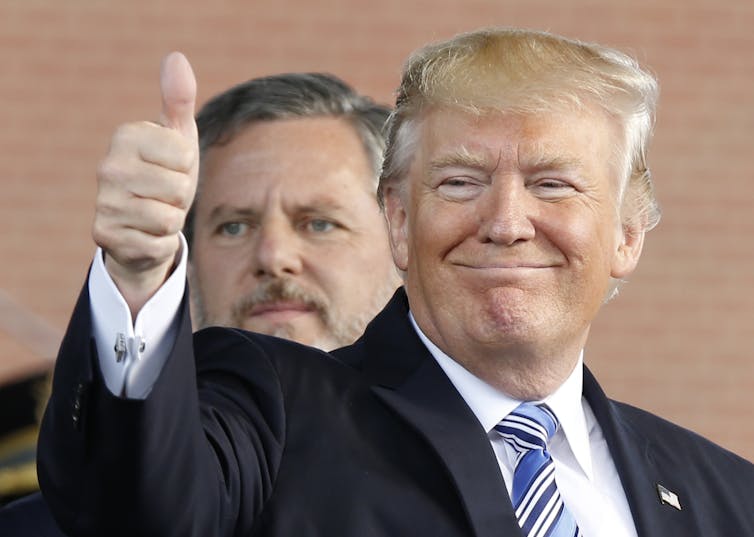Trump prophecy and other Christian movements: 3 essential reads
- Written by Kalpana Jain, Senior Religion + Ethics Editor
A new film, “Trump Prophecy,”[1] will be shown in some limited theaters on Oct. 2 and 4. The film is an adaptation of a book, co-authored by Mark Taylor, a retired firefighter, who claimed he received a message from God in 2011 that the Trump presidency is divinely ordained.
Liberty University film students are reported to have participated in the making of the film. At the same time, however, thousands of Liberty University students are also reported to have signed a petition saying they did not support[2] the film.
Media outlets, such as the Religion News Service, commented[3] that the “film is part of a small but influential Trump prophecy movement” that believes Trump’s election was part of God’s plans, and those who condemn him are servants of Satan.
Here are three stories from The Conversation’s archives that further explain a fast-growing Christian movement, and some others from the past, that have left a lasting impact.
1. Fastest-growing Christian movement
Related to the Trump prophecy movement is a rapidly growing Christian group that scholars Brad Christerson[4] and Richard Flory[5] call the “Independent Network Charismatic,” or INC, Christianity. As they explain[6], INC Christianity is led by a network of popular independent religious entrepreneurs, often referred to as “apostles.”
These scholars found that the apostles have close ties to conservative U.S. politicians, including Sarah Palin, Newt Gingrich, Bobby Jindal, Rick Perry and more recently, President Donald Trump.“
INC, they argue, is among the fastest growing Christian groups and is not concerned with building congregations, as has been the case in the past. Rather, its goal is to spread beliefs and practices. These scholars found in their research that, INC seeks "to bring heaven or God’s intended perfect society to Earth by placing ‘kingdom-minded people’ in powerful positions at the top of all sectors of society.”
To this movement, the Trump presidency is part of God’s plan.
2. Christian movements and their legacy
A question that could be asked is: What appeal does President Trump hold for an evangelical Christian base, given that, as Boston University’s Christopher Evans[7] says[8], he “does not demonstrate any of the beliefs that have historically characterized evangelicalism.” Trump, for example, “does not speak about the centrality of the Bible or, like Ronald Reagan and George W. Bush, of being ‘a born again’ Christian.”
A 19th-century movement known as New Thought, argues Evans, might provide an answer. According to Evans, New Thought ideas about individual happiness and wealth were later brought together in a movement called the prosperity gospel. The prosperity gospel spread the belief that religious faith can lead one to personal health and material wealth.
Norman Vincent Peale, who Trump cites as his “major religious influence,” further fused some of these beliefs. Peale believed that only in a free-market society could Christianity thrive. In this view of Christianity, Evans says, “personal weakness or failure,” is not an option. Peale also believed in a pro-Christian nationalism – all of which are also at the heart of Trump’s beliefs, Evans argues.
As Evans points out, Trump’s minister, Paula White, a prosperity gospel preacher, said in her invocation at the president’s inauguration, “We recognize that every good and every perfect gift comes from you and the United States of America is your gift, for which we proclaim gratitude.” These assertions, as Evans notes, are consistent with Trump’s faith.
3. Moral Majority’s influence today
 President Trump with Liberty University President Jerry Falwell Jr.
AP Photo/Steve Helber[9]
President Trump with Liberty University President Jerry Falwell Jr.
AP Photo/Steve Helber[9]
That Liberty University has been involved in the making of the film is also significant. Chris Nelson, an actor and film professor at Liberty University, plays the part of fireman Mark Taylor[10].
Liberty University, founded by Jerry Falwell Sr. is now led by his son, Jerry Falwell Jr., who has been a vocal supporter of Trump. As USC Dornsife’s Richard Flory[11] explains in another article[12], Falwell Sr. founded the Moral Majority in 1979 as a conservative Christian political lobbying group.
Falwell Sr. later moved into politics. However, as Flory says,
“Falwell’s move into politics also entailed a shift in his theological perspective. He moved from a separatist stance that taught that God controls everything, including politics, to one that required human action to fulfill God’s intended destiny for America.”
Flory notes that Falwell Sr.‘s movement represented a “mostly white, conservative fundamentalist and evangelical Christian world.” Their political battles were intended to save America from becoming a “moral quagmire.” Following Falwell Sr.’s death in 2007, that commitment, he says, seems to have fallen to his son.
References
- ^ “Trump Prophecy,” (www.thetrumpprophecymovie.com)
- ^ did not support (www1.cbn.com)
- ^ commented (religionnews.com)
- ^ Brad Christerson (theconversation.com)
- ^ Richard Flory (theconversation.com)
- ^ As they explain (theconversation.com)
- ^ Christopher Evans (theconversation.com)
- ^ says (theconversation.com)
- ^ AP Photo/Steve Helber (www.apimages.com)
- ^ plays the part of fireman Mark Taylor (www1.cbn.com)
- ^ USC Dornsife’s Richard Flory (theconversation.com)
- ^ explains in another article (theconversation.com)
Authors: Kalpana Jain, Senior Religion + Ethics Editor
Read more http://theconversation.com/trump-prophecy-and-other-christian-movements-3-essential-reads-104091

